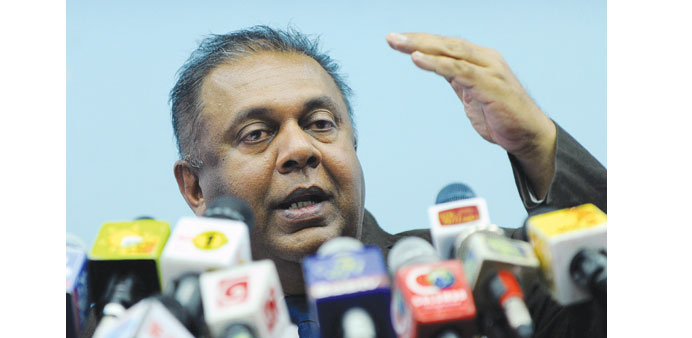AFP
Colombo
Sri Lanka’s proposed war crimes investigation has been delayed by several months until September as the government focuses on impending parliamentary elections, Foreign Minister Mangala
Samaraweera said yesterday.
Samaraweera said he hoped the composition of the investigating team along with its terms of reference would now be finalised just before the UN Human Rights Council’s session in
September in Geneva.
“We are working out the contours of a domestic mechanism to look into human rights abuses and war crimes,” Samaraweera told reporters in Colombo. “This will be in place before the
September sessions in Geneva.”
President Maithripala Sirisena came to power in January promising reconciliation and accountability following alleged atrocities during the island’s separatist war that ended
in 2009.
But Samaraweera said the government’s schedule of reforms including starting the probe by June has been pushed back because of a delay in
holding general elections.
Sirisena was due to sack the parliament he inherited from his autocratic predecessor Mahinda Rajapakse by April. He is now expected to dissolve parliament and call elections very shortly, Samaraweera said.
Sirisena is hoping to strengthen his numbers in parliament, where Rajapakse’s party and its allies still hold a majority, and bolster his mandate for
democratic reforms.
“I hope the president will dissolve parliament in a matter of hours and we can have an early election,” Samaraweera said amid intense speculation the 225-member assembly could be dissolved at midnight.
The US led international pressure on former president Rajapakse to probe allegations that up to 40,000 civilians were killed in the military’s final push to end the war against ethnic
minority Tamil rebels.
The UN has been investigating possible war crimes for more than a year and was due to unveil its report in March, but delayed the release to give Sri Lanka’s new government time to start its own probe.
CRACKDOWN ON LTTE FUNDING: The government yesterday said it was in the process of strengthening diplomatic ties with countries that have worked with Sri Lanka in the past to weaken the financial and support networks of the Tamil Tiger rebels.
Samaraweera told journalists that the government was firm in its resolve to combat terrorism in all its forms and manifestations.
He said the government agencies maintained close cooperation in intelligence sharing with all interlocutors, particularly those committed to combating terrorism and this includes combating financial networks.
Samaraweera’s comments came a day after former defence secretary Gotabaya Rajapakse and opposition parliamentarians warned that the country’s national security was still at risk after a recent US report claimed that despite its military defeat at the hands of the Sri Lankan government in 2009, the Tamil Tiger’s international network of sympathisers and financial
support still persists.
“This government is firm in its resolve to combat terrorism in all its forms and manifestations. This is, and always will be our consistent policy with regard to terrorism.
“Our nation has been torn apart by acts of terror for several decades in its history,” Samaraweera said in a speech read out in parliament which was later
released at a media briefing.
Samaraweera also warned that there was a threat of new forms of terrorism emerging which will be difficult to predict and may be hard to control if Sri Lanka isolates and radicalise aggrieved communities in the country.

Mangala Samaraweera speaking during a press conference in Colombo yesterday.
